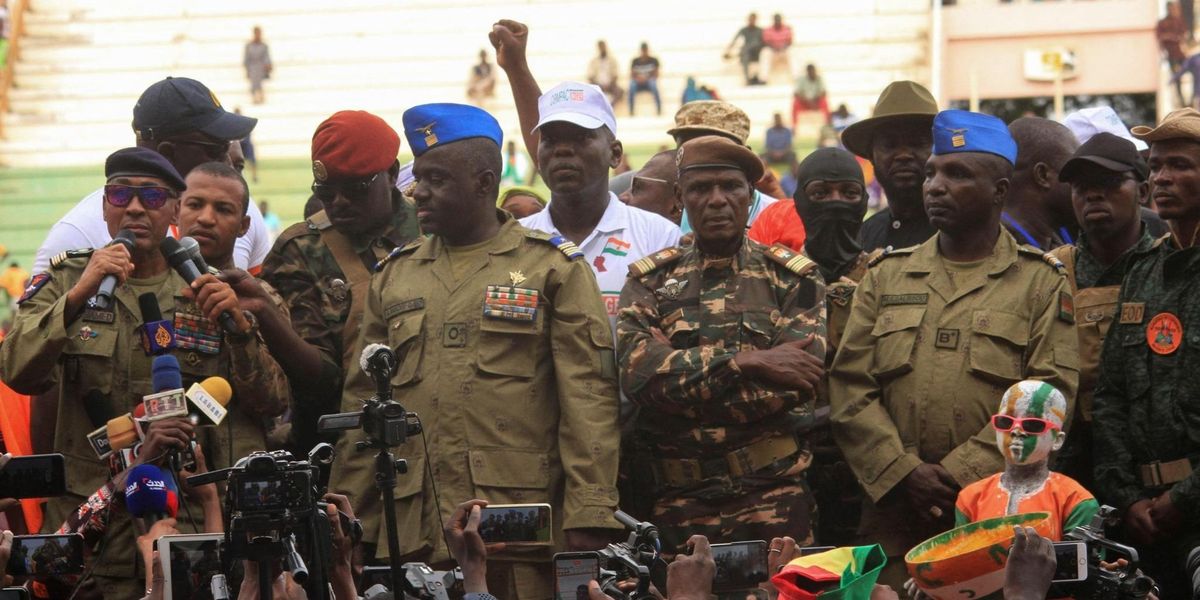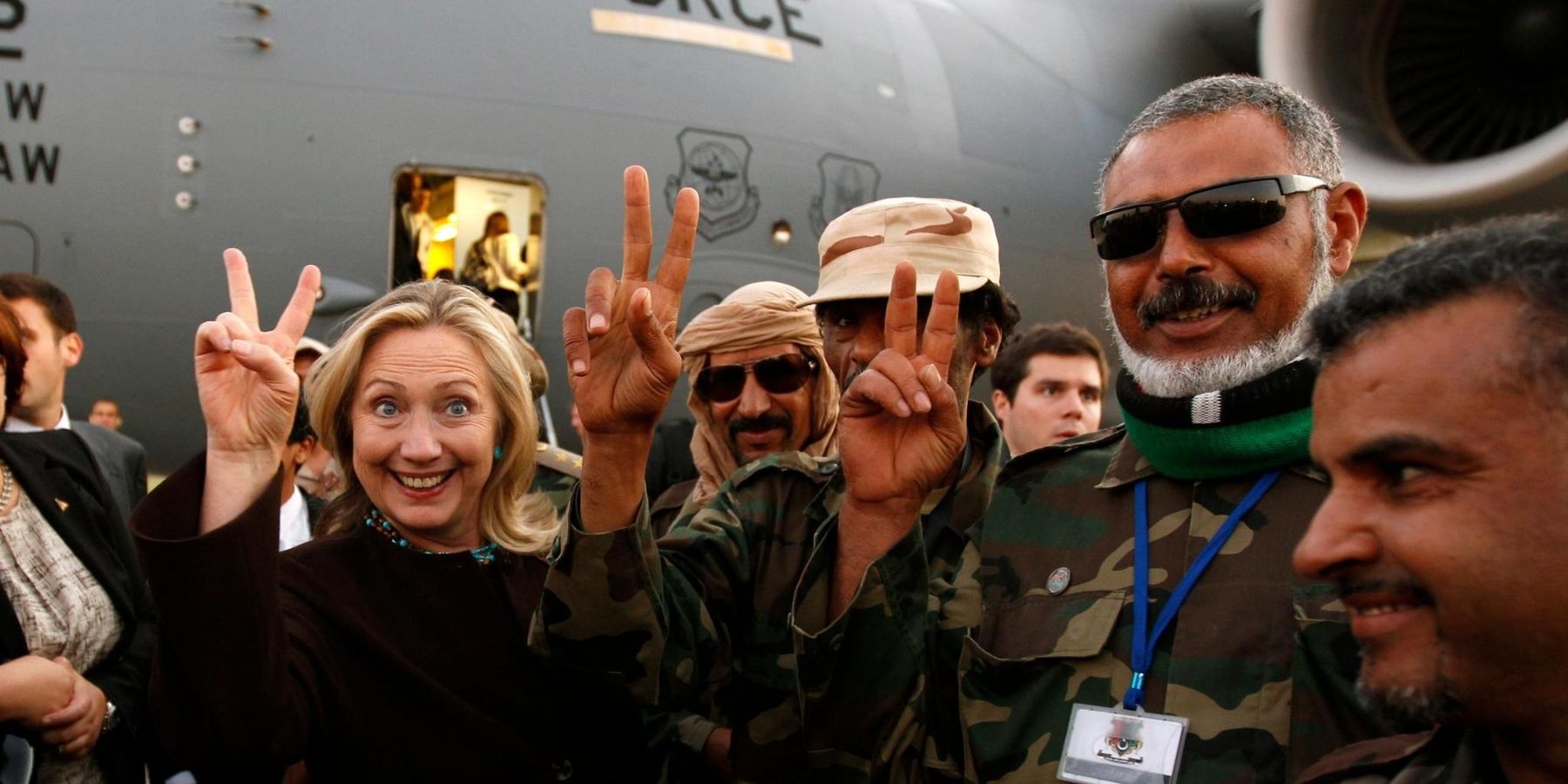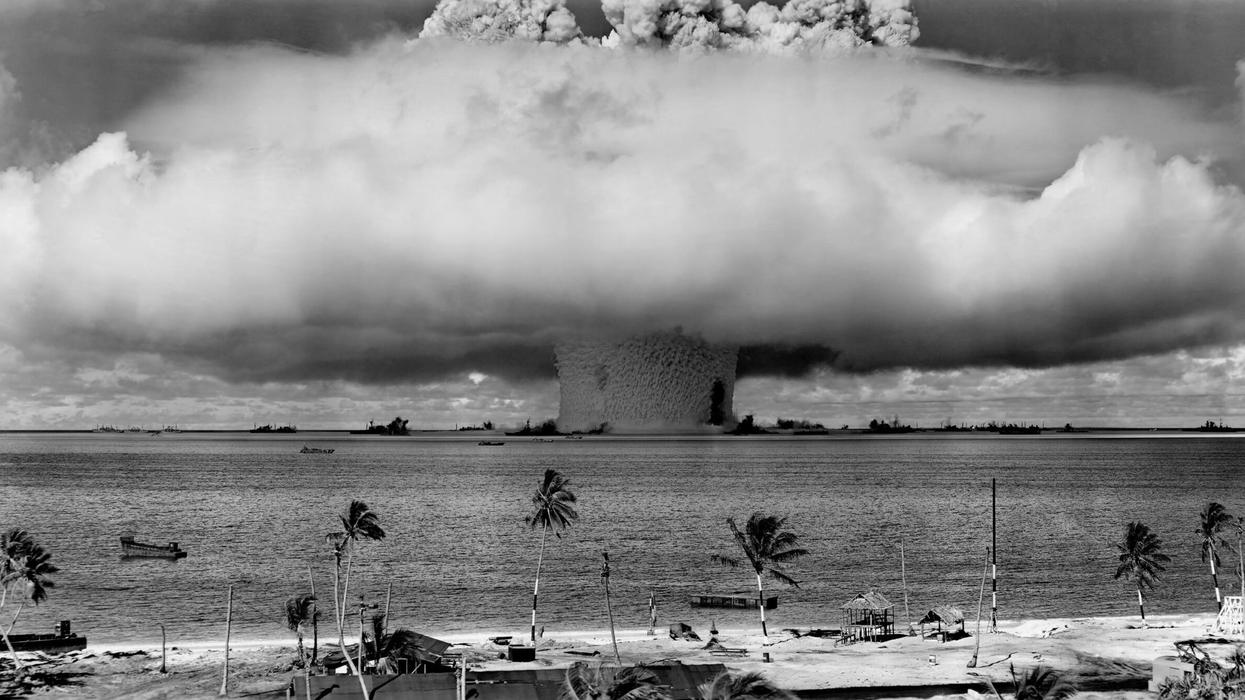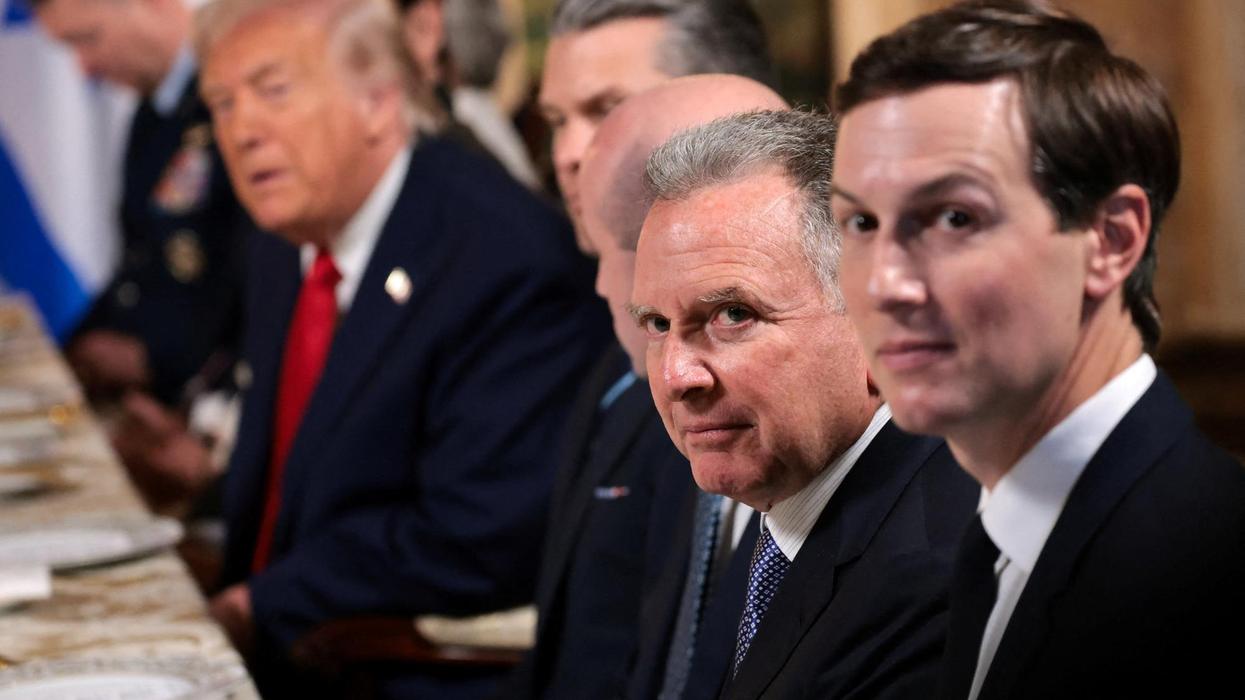The events in Niger over the past few months have been alarming to watch. What began as a military coup now risks spiraling into a wider war in West Africa, with a group of juntas lining up to fight against a regional force threatening to invade and restore democratic rule in Niamey.
The junta have explicitly justified their coup as a response to the “continuous deterioration of the security situation” plaguing Niger and complained that it and other countries in the Sahel “have been dealing for over 10 years with the negative socioeconomic, security, political and humanitarian consequences of NATO’s hazardous adventure in Libya.” Even ordinary Nigeriens backing the junta have done the same.
The episode thus reminds us of an iron rule of foreign interference: Even military interventions considered successful at the time have unintended effects that cascade long after the missions formally end.
The 2011 Libyan adventure saw the U.S., French and British governments launch an initially limited humanitarian intervention to protect civilians that quickly morphed into a regime change operation, unleashing a torrent of violence and extremism across the region.
There was little dissent at the time. As Libyan leader Muammar Gaddafi’s forces battled anti-government rebels, politicians, the press and anti-Gaddafi Libyans painted an overly simplistic picture of unarmed protesters and other civilians facing imminent if not already unfolding genocide. Only years later would a UK House of Commons Foreign Affairs Committee report publicly determine, echoing the conclusions of other post-mortems, that charges of an impending civilian massacre were “not supported by the available evidence” and that “the threat to civilians was overstated and that the rebels included a significant Islamist element” that carried out numerous atrocities of its own.Sens. John McCain (R-Ariz.), Joe Lieberman (I-Conn.), and John Kerry (D-Mass.) all called for a no-fly zone. “I love the military ... but they always seem to find reasons why you can’t do something rather than why you can,” complained McCain. The American Enterprise Institute’s Danielle Pletka said it would be “an important humanitarian step.” The now-defunct Foreign Policy Initiative (FPI) think tank gathered a who’s who of neoconservatives to repeatedly urge the same. In a letter to then-President Barack Obama, they quoted back Obama’s Nobel Peace Prize speech in which he argued that “inaction tears at our conscience and can lead to more costly intervention later.”
Then-Secretary of State Hillary Clinton, reportedly instrumental in persuading Obama to act, was herself swayed by similar arguments. Friend and unofficial adviser Sidney Blumenthal assured her that, once Gaddafi fell, “limited but targeted military support from the West combined with an identifiable rebellion” could become a new model for toppling Middle Eastern dictators. Pointing to the similar, deteriorating situation in Syria, Blumenthal claimed that “the most important event that could alter the Syrian equation would be the fall of Gaddafi, providing an example of a successful rebellion.” (Despite Gaddafi’s ouster, the Syrian civil war continues to this day, and its leader Bashar al-Assad is still in power).
Likewise, columnist Anne-Marie Slaughter urged Clinton to think of Kosovo and Rwanda, where “even a small deployment could have stopped the killing,” and insisted U.S. intervention would “change the image of the United States overnight.” In one email, she dismissed counter-arguments:“People will say that we will then get enmeshed in a civil war, that we cannot go into another Muslim country, that Gaddafi is well armed, there will be a million reasons NOT to act. But all our talk about global responsibility and leadership, not to mention respect for universal values, is completely empty if we stand by and watch this happen with no response but sanctions.”
Despite grave and often-stated reservations, Obama and NATO got UN authorization for a no-fly zone. Clinton was privately showered with email congratulations, not just from Blumenthal and Slaughter (“bravo!”; “No-fly! Brava! You did it!”), but even from then-Bloomberg View Executive Editor James Rubin (“your efforts ... will be long remembered”). Pro-war voices like Pletka and Iraq War architect Paul Wolfowitz immediately began moving the goalposts by discussing Gaddafi’s ouster, suggesting escalation to prevent a U.S. “defeat,” and criticizing those saying Libya wasn’t a vital U.S. interest.
NATO’s undefined war aims quickly shifted, and officials spoke out of both sides of their mouths. Some insisted the goal wasn’t regime change, while others said Gaddafi “needs to go.” It took less than three weeks for FPI Executive Director Jamie Fly, the organizer of the neocons’ letter to Obama, to go from insisting it would be a “limited intervention” that wouldn’t involve regime change, to professing “I don’t see how we can get ourselves out of this without Gaddafi going.”
After only a month, Obama and NATO allies publicly pronounced they would stay the course until Gaddafi was gone, rejecting the negotiated exit put forward by the African Union. “There is no mission creep,” NATO Secretary General Anders Fogh Rasmussen insisted two months later. Four months after that, Gaddafi was dead — captured, tortured and killed thanks in large part to a NATO airstrike on the convoy he was traveling in.
The episode was considered a triumph. “We came, we saw, he died,” Clinton joked to a reporter upon hearing the news. Analysts talked about the credit owed to Obama for the “success.” “As Operation Unified Protector comes to a close, the alliance and its partners can look back at an extraordinary job, well done,” wrote then-U.S. Permanent Representative to NATO Ivo Daalder and then-Supreme Allied Commander in Europe James Stavridis in October 2011. “Most of all, they can see in the gratitude of the Libyan people that the use of limited force — precisely applied — can affect real, positive political change.” That same month, Clinton traveled to Tripoli and declared “Libya’s victory” as she flashed a peace sign.
“It was the right thing to do,” Obama told the UN, presenting the operation as a model that the United States was “proud to play a decisive role” in. Soon discussion moved to exporting this model elsewhere, like Syria. Hailing the UN for having “at last lived up to its duty to prevent mass atrocities,” then-Human Rights Watch Executive Director Kenneth Roth called to “extend the human rights principles embraced for Libya to other people in need,” citing other parts of the Middle East, the Ivory Coast, Myanmar and Sri Lanka.
Others disagreed. “Libya has given [the mandate of ‘responsibility to protect’] a bad name,” complained Indian UN Ambassador Hardeep Singh Puri, echoing the sentiments of other diplomats angry that a UN mandate for protecting civilians had been stretched to regime change.
It soon became clear why. Gaddafi’s toppling not only led hundreds of Tuareg mercenaries under his employ to return to nearby Mali but also caused an exodus of weapons from the country, leading Tuareg separatists to team up with jihadist groups and launch an armed rebellion in the country. Soon, that violence triggered its own coup and a separate French military intervention in Mali, which quickly became a sprawling Sahel-wide mission that only ended nine years later with the situation, by some accounts, worse than it started. According to the UN High Commissioner for Refugees, the majority of the more than 400,000 refugees in the Central Sahel were there because of the violence in Mali.
Colonel Sidi Mohamed delivers a message as he stands with other Nigerien junta leaders while Nigeriens gather one month since coup, in support of the putschist soldiers and to demand French ambassador to leave, in the capital Niamey, Niger August 26, 2023. REUTERS/Mahamadou Hamidou
Mali was far from alone. Thanks to its plentiful and unsecured weapons depots, Libya became what UK intelligence labeled the “Tesco” of illegal arms trafficking, referring to the British supermarket chain. Gaddafi’s ouster “opened the floodgates for widespread extremist mayhem” across the Sahel region, retired Senior Foreign Service officer Mark Wentling wrote in 2020, with Libyan arms traced to criminals and terrorists in Niger, Tunisia, Syria, Algeria and Gaza, including not just firearms but also heavy weaponry like antiaircraft guns and surface-to-air missiles. By last year, extremism and violence was rife throughout the region, thousands of civilians had been killed and 2.5 million people had been displaced.
Things are scarcely better in “liberated” Libya today. The resulting power vacuum produced exactly what Iraq War critics predicted: a protracted (and forever close-to-reigniting) civil war involving rival governments, neighboring states using them as proxies, hundreds of militias and violent jihadists. Those included the Islamic State, one of several extremist groups that made real Clinton’s pre-intervention fear of Libya “becoming a giant Somalia.” By the 2020 ceasefire, hundreds of civilians had been killed in Libya, nearly 900,000 needed humanitarian assistance, half of them women and children, and the country had become a lucrative hotspot for slave trading.
Today, Libyans are unambiguously worse off than before NATO intervention. Ranked 53rd in the world and first in Africa by the 2010 UN Human Development Index, the country had dropped fifty places by 2019. Everything from GDP per capita and the number of fully functioning health care facilities to access to clean water and electricity sharply declined. Far from improving U.S. standing in the Middle East, most of the Arab world opposed the NATO operation by early 2012.
Only five years later, Clinton, once eager to claim credit, distanced herself from the decision to intervene. “It didn’t work,” Obama admitted bluntly as he prepared to leave office, publicly deeming the country “a mess” and, privately, “a shit show.” The New York Times collected the damning verdicts of those involved: “We made it worse”; “Gaddafi is laughing at all of us from his grave”; “by God, if we can’t succeed here, it should really make one think about embarking on these kind of efforts.”
Libya offers numerous cautionary tales about well-meaning U.S. military interventions, from the way they rapidly escalate beyond their initial goals and limited nature, to their penchant for unforeseen knock-on effects that are hard to control and snowball disastrously. As Obama’s “success” in the country now threatens to spark a regional war in Niger that could even drag the United States into the fighting, it should remind us that the consequences of military action and rejection of negotiated solutions last much longer than, and look very different years after, the initial period of triumphalism.















